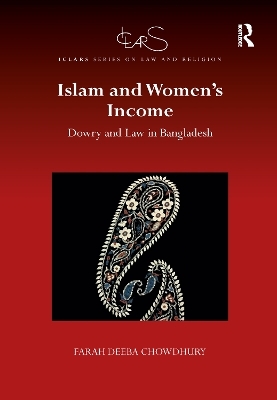
Islam and Women's Income
Dowry and Law in Bangladesh
Seiten
2020
Routledge (Verlag)
978-0-367-59554-8 (ISBN)
Routledge (Verlag)
978-0-367-59554-8 (ISBN)
This book examines the interrelationship between law, culture, patriarchy and religion in the context of contemporary Bangladesh. Taking a socio-legal approach, it analyses the changing nature of the dowry practice and its relation to women’s increasing paid labour force activity. Despite anti-dowry legislation, it is argued here that the dowry
This book examines the interrelationship between law, culture, patriarchy and religion in the context of contemporary Bangladesh. It explores the role of Islam in society and politics generally, and its influence on gender equality in particular. The work focuses on the situation of married women. Taking a socio-legal approach, it analyses the changing nature of the dowry practice and its relation to women’s increasing paid labour force activity. Despite anti-dowry legislation, it is argued here that the dowry system continues in the form of the appropriation of wives’ income. The work calls for legal recognition of this action and the amendment of the Dowry Prohibition Act 1980 as a result of the changing social realities that are taking place in the lives of Bangladeshi women. An Islamic approach is applied to equality between men and women in addressing and analysing these issues. The book includes international comparisons on gender equality and discusses the role of the Convention on the Elimination of All Forms of Descrimination Against Women (CEDAW), as well as the dowry system in South Asia.
The book will be of interest to academics and researchers working in the areas of law and religion, gender studies and international development.
This book examines the interrelationship between law, culture, patriarchy and religion in the context of contemporary Bangladesh. It explores the role of Islam in society and politics generally, and its influence on gender equality in particular. The work focuses on the situation of married women. Taking a socio-legal approach, it analyses the changing nature of the dowry practice and its relation to women’s increasing paid labour force activity. Despite anti-dowry legislation, it is argued here that the dowry system continues in the form of the appropriation of wives’ income. The work calls for legal recognition of this action and the amendment of the Dowry Prohibition Act 1980 as a result of the changing social realities that are taking place in the lives of Bangladeshi women. An Islamic approach is applied to equality between men and women in addressing and analysing these issues. The book includes international comparisons on gender equality and discusses the role of the Convention on the Elimination of All Forms of Descrimination Against Women (CEDAW), as well as the dowry system in South Asia.
The book will be of interest to academics and researchers working in the areas of law and religion, gender studies and international development.
Farah Deeba Chowdhury is a Scholar in Residence at the Global Labour Research Centre, York University, Canada. She has served as an Associate Professor in the Department of Political Science at the University of Rajshahi, Bangladesh and has also held an SSHRC Postdoctoral Fellowship in the Department of Gender Studies at Queen’s University, Canada. She specializes in the areas of Islam, gender and law; gender and work; gender and politics; and gender and development. She has published widely on these topics.
| Erscheinungsdatum | 01.07.2020 |
|---|---|
| Reihe/Serie | ICLARS Series on Law and Religion |
| Verlagsort | London |
| Sprache | englisch |
| Maße | 174 x 246 mm |
| Gewicht | 453 g |
| Themenwelt | Recht / Steuern ► Allgemeines / Lexika |
| Recht / Steuern ► EU / Internationales Recht | |
| Recht / Steuern ► Öffentliches Recht ► Völkerrecht | |
| Recht / Steuern ► Privatrecht / Bürgerliches Recht ► Familienrecht | |
| ISBN-10 | 0-367-59554-0 / 0367595540 |
| ISBN-13 | 978-0-367-59554-8 / 9780367595548 |
| Zustand | Neuware |
| Haben Sie eine Frage zum Produkt? |
Mehr entdecken
aus dem Bereich
aus dem Bereich


